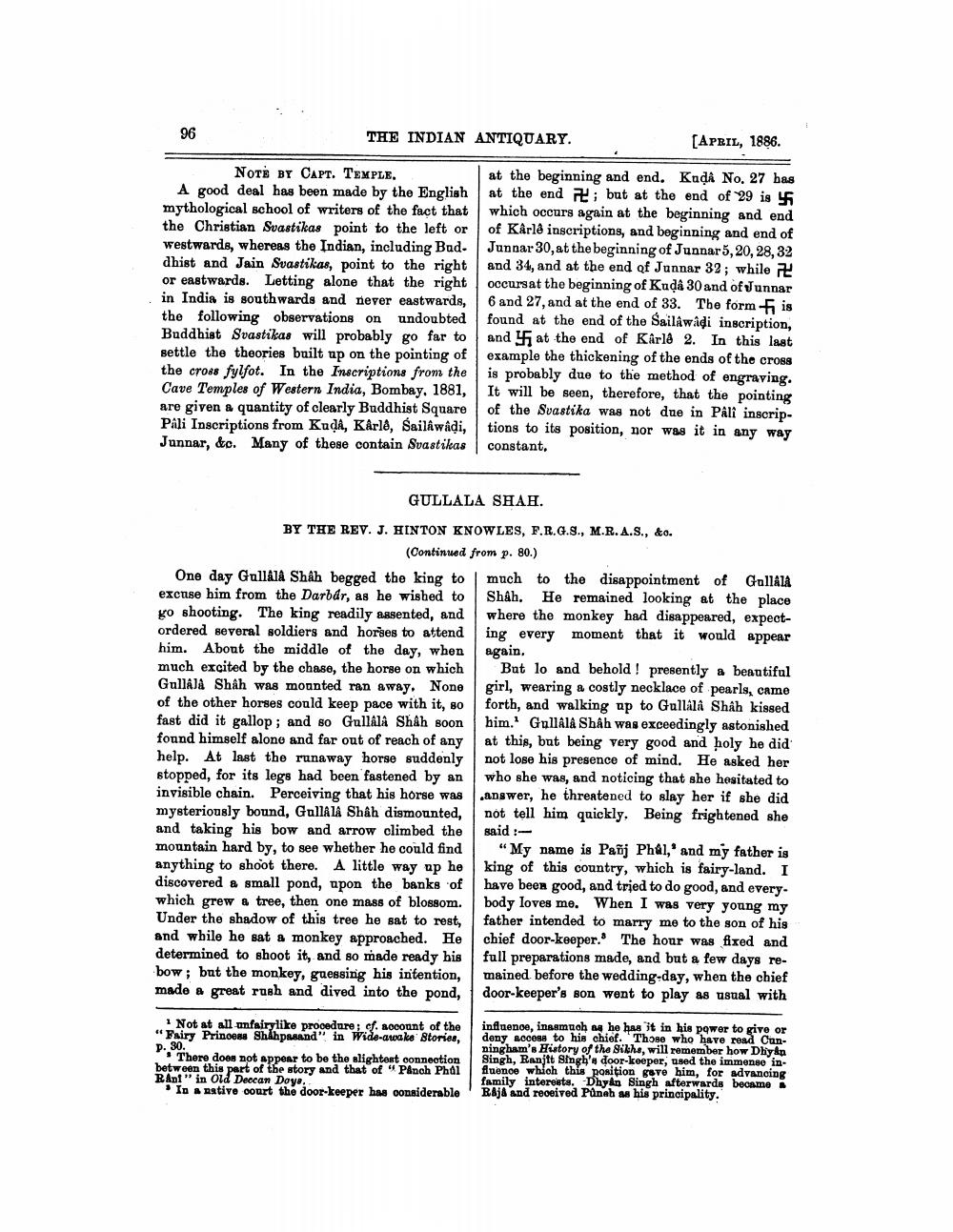________________
96
THE INDIAN ANTIQUARY.
(APRIL, 1886.
NOTS BY CAPT. TEMPLE. A good deal has been made by the English mythological school of writers of the fact that the Christian Svastikas point to the left or westwards, whereas the Indian, including Bad. dhist and Jain Svastikas, point to the right or eastwards. Letting alone that the right in India is southwards and never eastwards, the following observations on undoubted Buddhist Svastikas will probably go far to settle the theories built up on the pointing of the cross fylfot. In the Inscriptions from the Cave Temples of Western India, Bombay, 1881, are given a quantity of clearly Buddhist Square PAli Inscriptions from Kuda, Kärld, Sailwadi, Junnar, &c. Many of these contain Svastikas
at the beginning and end. Kuda No. 27 has at the end ; but at the end of 29 is 45 which occurs again at the beginning and end of Kärlə inscriptions, and beginning and end of Junnar 30, at the beginning of Junnar 5, 20, 28, 32 and 34, and at the end of Junnar 32; while occursat the beginning of Kuda 30 and of Junnar 6 and 27, and at the end of 33. The form fi is found at the end of the Sailawadi inscription, and f, at the end of Karl8 2. In this last example the thickening of the ends of the cross is probably due to the method of engraving. It will be seen, therefore, that the pointing of the Svastika was not due in Páli inscriptions to its position, nor was it in any way constant,
GULLALA SHAH.
BY THE REV. J. HINTON KNOWLES, F.R.G.S., M.R.A.S., &o.
(Continued from p. 80.) One day GullAl Shah begged the king to much to the disappointment of GullA1A excuse him from the Darbdr, as he wished to Shah. He remained looking at the place go shooting. The king readily assented, and where the monkey had disappeared, expectordered several soldiers and horses to attending every moment that it would appear him. About the middle of the day, when
again. much excited by the chase, the horse on which But lo and behold! presently a beautiful GullAlů Shâh was mounted ran away. None girl, wearing a costly necklace of pearls, came of the other horses could keep pace with it, so forth, and walking up to Gullâlâ Shâh kissed fast did it gallop; and so Gullala Shah soon him. Gullald Shâh was exceedingly astonished found himself alone and far out of reach of any at this, but being very good and holy he did help. At last the runaway horse suddenly not lose his presence of mind. He asked her stopped, for its legs had been fastened by an who she was, and noticing that she hesitated to invisible chain. Perceiving that his horse was answer, he threatened to slay her if she did mysteriously bound, Gulla Shâh dismounted, not tell him quickly. Being frightened she and taking his bow and arrow climbed the said :mountain hard by, to see whether he could find "My name is Pañj Phál,' and my father is anything to shoot there. A little way up he king of this country, which is fairy-land. I discovered a small pond, upon the banks of have been good, and tried to do good, and every. which grew a tree, then one mass of blossom. body loves me. When I was very young my Under the shadow of this tree he sat to rest, father intended to marry me to the son of his and while he sat a monkey approached. He chief door-keeper. The hour was fixed and determined to shoot it, and so made ready his full preparations made, and but a few days rebow; but the monkey, guessing his intention, mained before the wedding day, when the chief made a great rush and dived into the pond, door-keeper's son went to play as usual with
1 Not at all unfairylike procedure; cf. account of the influence, inasmuch as he has it in his power to give or "Fairy Princess ShAhpasand" in Wide-awake Stories, deny accosa to his chief. Those who have read Can.
ningham's History of the Sikhs, will remember how Dhiyan There does not appear to be the slightest connection Singh, Ranjft Singh's door-keeper, used the immenso inbetween this part of the story and that of "Panch Phdi fluence which this position gave him, for advancing Rant" in Old Deccan Doyo.
family interests. Dhyan Singh afterwards became & In a native court the door-keeper has considerable' Raja and received Punah as his principality.
P. 30.




